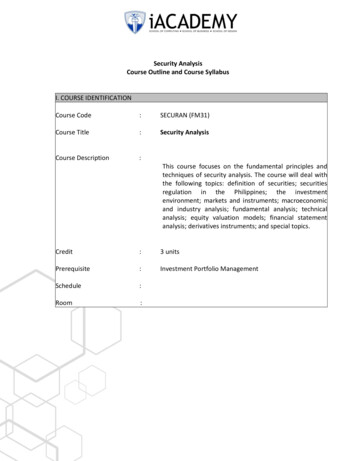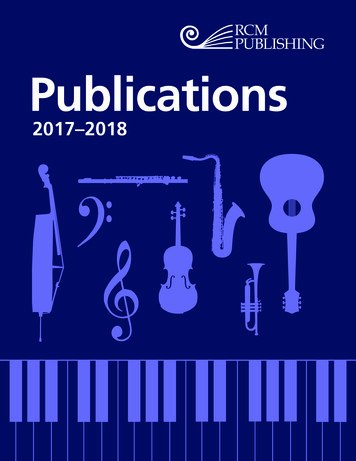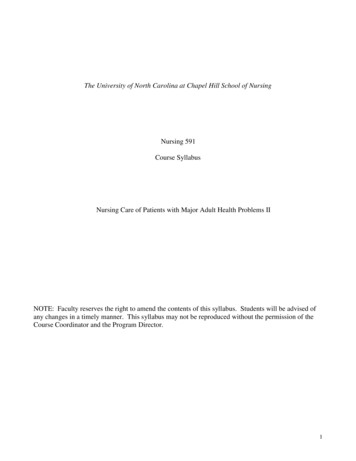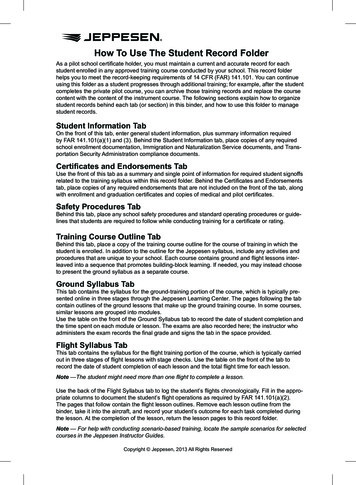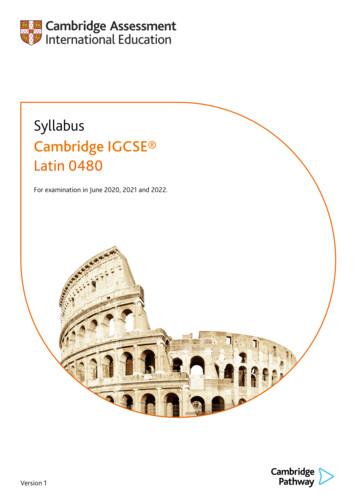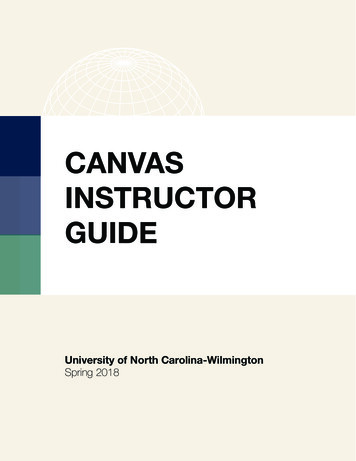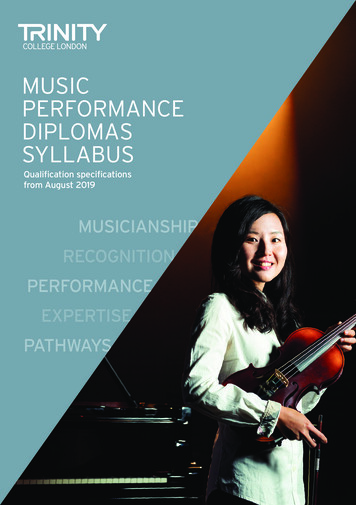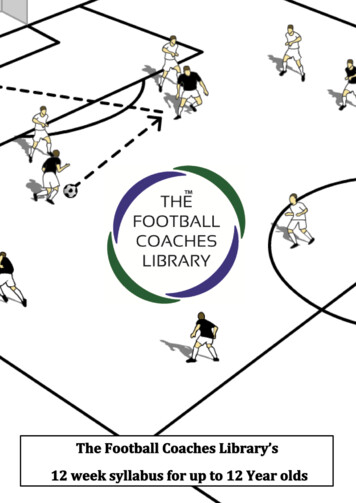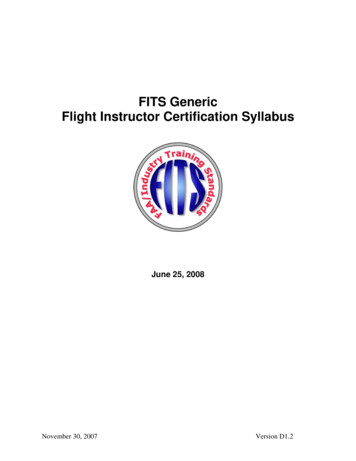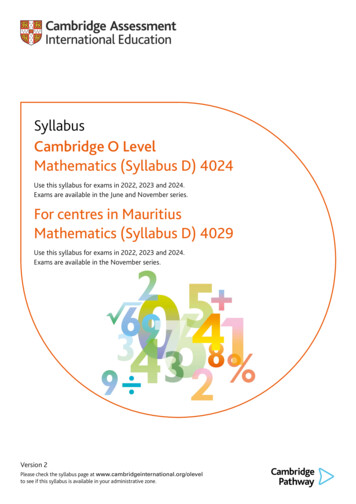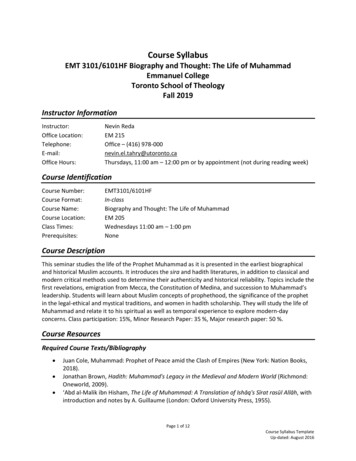
Transcription
Course SyllabusEMT 3101/6101HF Biography and Thought: The Life of MuhammadEmmanuel CollegeToronto School of TheologyFall 2019Instructor InformationInstructor:Office Location:Telephone:E-mail:Office Hours:Nevin RedaEM 215Office – (416) 978-000nevin.el.tahry@utoronto.caThursdays, 11:00 am – 12:00 pm or by appointment (not during reading week)Course IdentificationCourse Number:Course Format:Course Name:Course Location:Class y and Thought: The Life of MuhammadEM 205Wednesdays 11:00 am – 1:00 pmNoneCourse DescriptionThis seminar studies the life of the Prophet Muhammad as it is presented in the earliest biographicaland historical Muslim accounts. It introduces the sira and hadith literatures, in addition to classical andmodern critical methods used to determine their authenticity and historical reliability. Topics include thefirst revelations, emigration from Mecca, the Constitution of Medina, and succession to Muhammad’sleadership. Students will learn about Muslim concepts of prophethood, the significance of the prophetin the legal-ethical and mystical traditions, and women in hadith scholarship. They will study the life ofMuhammad and relate it to his spiritual as well as temporal experience to explore modern-dayconcerns. Class participation: 15%, Minor Research Paper: 35 %, Major research paper: 50 %.Course ResourcesRequired Course Texts/Bibliography Juan Cole, Muhammad: Prophet of Peace amid the Clash of Empires (New York: Nation Books,2018).Jonathan Brown, Hadith: Muhammad's Legacy in the Medieval and Modern World (Richmond:Oneworld, 2009).‘Abd al-Malik ibn Hisham, The Life of Muhammad: A Translation of Ishāq's Sīrat rasūl Allāh, withintroduction and notes by A. Guillaume (London: Oxford University Press, 1955).Page 1 of 12Course Syllabus TemplateUp-dated: August 2016
Optional Readings: Martin Lings, Muhammad: His Life Based on the Earliest Sources (Rochester, Vt.: InnerTraditions, 2006).Jonathan Brown, Muhammad: A Very Short Introduction (Oxford: Oxford University Press, 2011).Ramadan al-Buti, The Jurisprudence of the Prophetic Biography, translated by Nancy Roberts(Damascus: Dar al-Fikr, 2006).Jonathan E. Brockopp (ed.), The Cambridge Companion to Muḥammad (New York: CambridgeUniversity Press, 2010).Additional Bibliography (for book reviews)1. Faqihuddin Abdul Kodir. Hadith and Gender Justice: Understanding the Prophetic Tradition(Cirebon, West Java, Indonesia: Fahmina Institute, 2007).2. ʻAbdul Fattah Abu Ghuddah, Prophet Muhammad: The Teacher, translated by Muhammad ZahidAbu Ghuddah, edited by Yasrab Dawud Shah (Swansea, U.K.: Claritas Books, 2017).ORʻAbdul Fattah Abu Ghuddah, Prophet Muhammad: The Teacher and His TeachingMethodologies, translated by Mahomed Mahomedy.(Karachi : Zam Zam Publishers, 2003).3. Kecia Ali, The Lives of Muhammad (Cambridge: Harvard University Press, 2014).4. Karen Armstrong, Muhammad: A Biography of the Prophet (London: Phoenix, 2009).5. Nimat Hafez Barazangi, Woman’s Identity and Rethinking the Hadith (Farnham, Surrey: Ashgate,2015).6. Jonathan A. C. Brown, The Canonization of al-Bukhārī and Muslim: The Formation and Functionof the Sunnī Ḥadīth Canon (Leiden: Brill, 2007).7. Ramadan al-Buti, The Jurisprudence of the Prophetic Biography, translated by Nancy Roberts(Damascus: Dar al-Fikr, 2006).8. Deepak Chopra, A Story of the Last Prophet (New York: HarperOne, 2010).9. Adis Duderija (ed.), The Sunna and its Status in Islamic Law: The Search for a Sound Hadith (NewYork, NY: Palgrave Macmillan, 2015).10. Muhammad al-Ghazali, Fiqh-us-seerah: Understanding the Life of Prophet Muhammad (Riyadh:International Islamic Federation of Student Organizations, IIFSO: Distribution by InternationalIslamic Pub. House, 1999).11. –——, The Sunna of the Prophet: The People of Fiqh versus the People of Hadith, translated byA.H. Bewley, M.I. Waley and Aisha Abdurrahman Bewley (Dar Al Taqwa Ltd, 2009)12. Anne Hege Grung, Gender Justice in Muslim-Christian Readings: Christian and Muslim Women inNorway Making Meaning of Texts from the Bible, the Koran, and the Ḥadīth (Leiden: BrillRodopi, [2016])13. Paul Gwynne, Buddha, Jesus and Muhammad: A Comparative Study (Hoboken: Wiley, 2014).14. G. H. A. Juynboll, The Authenticity of the Tradition Literature: Discussions in Modern Egypt(Leiden E.J. Brill 1969).15. Mohammad Hashim Kamali. A Textbook of Ḥadīth Studies: Authenticity, Compilation,Classification and Criticism of Ḥadīth, 2nd ed. (Markfield: Islamic Foundation, 2008).16. Michael Muhammad Knight, Muhammad: Forty Introductions (New York, NY: Soft Skull, 2019).17. John Andrew Morrow, The Covenants of the Prophet Muhammad with the Christians of theWorld (Tacoma, WA: Sophia Perennis, 2013).18. Harald Motzki (ed.), Ḥadīth: Origins and Developments (London: Routledge, 2016).Page 2 of 12Course Syllabus TemplateUp-dated: August 2016
19. Harald Motzki, Nicolet Boekhoff-van der Voort and Sean W. Anthony, Analyzing MuslimTradition (Leiden: Brill, 2013).20. Andrew J. Newman, The Formative Period of Twelver Shīʾism: Ḥadīth as a Discourse BetweenQum and Baghdad (London: Routledge, 2010).21. Rawand Osman, Female Personalities in the Qur’an and Sunna: Examining the Major Sources ofImami Shi‘i Islam (London: Routledge, 2015).22. F. E. Peters, Jesus and Muhammad: Parallel Tracks, Parallel Lives (Oxford: Oxford UniversityPress, 2011).23. Yusuf Al-Qaradawi, Approaching the Sunnah: Comprehension and Controversy (InternationalInstitute of Islamic Thought, 2007).24. Omid Safi, Memories of Muhammad: Why the Prophet Matters (New York, NY: HarperCollins,2009).25. Ziauddin Sardar, Muhammad: All that Matters. .New York: McGraw-Hill Companies, 2012.26. Asma Sayeed, Women and the Transmission of Religious Knowledge in Islam (Cambridge:Cambridge University Press, 2013).27. Khalid Tarifi, Images of Muhammad: Narratives of the Prophet in Islam Across the Centuries(New York: Doubleday, 2009).28. John Tolan, Faces of Muhammad: Western Perceptions of the Prophet of Islam from the MiddleAges to Today (Princeton, New Jersey: Princeton University Press, 2019).Course Website(s) Quercus: https://q.utoronto.ca/This course uses Quercus for its course website. To access it, go to the UofT Quercus login page athttps://q.utoronto.ca/ and login using your UTORid and password. Once you have logged in to Quercususing your UTORid and password, look for the My Courses module, where you’ll find the link to thewebsite for all your Quercus-based courses. (Your course registration with ACORN gives you access tothe course website in Quercus.) Information for students about using Quercus can be found at:https://community.canvaslms.com/docs/DOC-10701. Students who have trouble accessing Quercusshould ask Wanda Chin for further help.]Course Learning Objectives/OutcomesEMT 3101 Learning OutcomesStudents who have successfully completed the course will:Religious Faith and Heritage Demonstrate knowledge of religious heritage, and articulate clearly their own theologicalpositions (as related to pastoral practices). Interpret scripture and religious texts using a variety of methods, sources, and norms. Identify and respect the diversity of theological viewpoints and practices within their religioustradition.Culture and Context Demonstrate critical understanding for one’s area of specialization of the relationshipbetween faith practices and cultural contexts.Page 3 of 12Course Syllabus TemplateUp-dated: August 2016
Give evidence of critical self-awareness with regard to their own—and others’--faithperspectives and practices of educational ministry.Practices of Area of Specialization Demonstrate knowledge of theories and practices relevant to leadership in their own area ofspecialization.EMT 6101 Learning OutcomesStudents who have successfully completed the course will demonstrate:Knowledge of the area of concentration Comprehension of significant aspects of Muhammad’s life in the context of seventh centuryArabia.Comprehension of significant aspects of the history and sources of hadithAbility with Scholarly Tools and Skills Competence in the use of a library and in the construction of a bibliographyFamiliarity with pertinent web-based resources and skills.Competence in the following skills:o Clear and effective communication in both oral and written forms;o The construction of a logical argument;o The making of informed judgments on complex issues;o The use of standard conventions of style for scholarly writing.Ability to carry out specialized research Attained competence in the area of Muhammad’s biography and a basic familiarity with hadithGained an understanding of the nature and processes of researchDeveloped a critical awareness of the nature and authenticity of the sources on Muhammad'slife and the difficulty of separating hagiography from history in studying biographies of foundersof world religions.Attained a basic familiarity with the methodologies of hadith criticism in classical andcontemporary scholarship.EvaluationEach student should know from the outset that this course requires regular attendance, dailyreading, both written and oral assignments, and class participation. For the Emmanuel CollegeAttendance Policy, see below.Page 4 of 12Course Syllabus TemplateUp-dated: August 2016
RequirementsThe final grade for the course will be based on evaluations in three areas.(1) Preparation, participation and reading (15%) –In addition to participating in the regular activity ofthe class, including the reading of the required texts, students are expected to devote two hours ormore outside of class for every hour of classroom instruction. Use this time to prepare the requiredreadings and primary texts in advance. Always be ready to provide a brief summary of each reading,list the main points and explain how the readings relate to one another. Your class participationmark will reflect your participation in classroom discussions and one oral presentations on yourbook reviews or minor research paper. Presentation dates will be determined on the first day ofclass. Although not mandatory, you are also highly encouraged to attend the writing workshops (seebelow).(2) Two book reviews OR minor research paper (35%) –Books will be assigned on the first day of classfrom the below bibliography. Your reviews should be 3-4 pages each in double-spaced 12 pt TimesNew Roman font. For advice on how to write a book review, go ypes-of-writing/book-review. For editing yourreview, go to iting.Students in the 3000 level course have the option of writing a minor research paper on the topic ofthe prophet Muhammad’s leadership through modern eyes in lieu of the two book reviews. Thisassignment is a foray into interdisciplinary studies, exploring the biography of the prophetMuhammad in conjunction with leadership theories from the realm of business management. Topicswill be handed out on the first day of class. Your paper should be 7-8 pages in double-spaced 12 ptTimes New Roman font.(3) Final paper (50%) – A substantial scholarly research of 15-18 pages in double-spaced 12 pt TimesNew Roman font. Footnotes and bibliography should consistently follow Chicago Manual of Style(available on-line through the library website) Your paper must include the following:Title page. This includes the paper title, the student's name, the course code and name, the name ofthe instructor and the date of submission.Introduction. The most important part of the Introduction is the thesis statement, setting out in thebriefest possible form the exact proposition or hypothesis which the paper will demonstrate. TheIntroduction also provides the context necessary to show why the paper is important. To this end itidentifies the research question and describes its broader setting in academic research. It givesattention to previous enquiry and the state of the scholarship on this issue, such as relevantsecondary literature. The Introduction should also include a description of the project as a whole(i.e. a one-paragraph road map outlining what you plan to do).If you want, you can also include a brief section on method, for example, describing the relevantprimary literature and the methods to be used for interpreting it.Your introduction should not exceed one or two pages, depending on the length of your paper.Some students like to write two or three paragraphs: one with the thesis statement, one with theroad map, and one on the state of the scholarship.Exposition. The main body of the paper is the clarification, development, and demonstration of thethesis statement, using authoritative evidence. The exposition is typically organized as parts of anPage 5 of 12Course Syllabus TemplateUp-dated: August 2016
argument. The interrelationship of the parts of the exposition, and the direct relevance of each partof the exposition to the thesis statement, should be clear to the reader.Conclusion. The thesis statement should be recapitulated, the demonstration should besummarized, the limitations of the demonstration and the remaining uncertainties should beacknowledged, and the implications of the study for the faith community, the wider scholarlycommunity, and/or the world should be set forth.Bibliography. Books, articles, and other sources that have been used must be listed. Primary andsecondary literature should always be distinguished.(This description is derived from the TST Basic Degree thesis requirements with some modifications.)Grading SystemA (90-100)A (85-89)A- (80-84)B (77-79)B (73-76)B- (70-72)FailurePlease see the appropriate handbook for more details about the grading scale and non-numerical grades(e.g. SDF, INC, etc).Due DatesComponentClass ParticipationMinor ResearchMajor Research PaperWeight15 %35 %50 %Due DateN/AOct. 16th @ 11:00 amNov. 27th @ 11:00 amSubmission GuidelinesPlease submit your assignments in both paper and electronic formats by the due dates/times. Forelectronic submissions, please email them to nevin.el.tahry@utoronto.ca . If you do not receive aresponse acknowledging that I have received your assignment within 24 hours, then please resend,since, I will probably not have received it.Writing WorkshopsTo assist you write better reflection papers, essays, and research papers, I have organized one-hour,weekly writing workshops on Wednesdays 9:00-10:00 am, beginning with September 18th, 2019 andending with November 27th, 2019. There will be no writing workshop during reading week. They will beheld in the electronic classroom over in the E.J. Pratt Library, room 306, across from the elevator on the3rd floor at Pratt. In the past, students who have attended writing workshops have generally donebetter in their writing assignments. You are highly encouraged to attend.Page 6 of 12Course Syllabus TemplateUp-dated: August 2016
Late work. Students are expected to hand in assignments by the above dates. Penalty for lateassignments is 2% reduction in mark per day of lateness for a maximum of one week, after whichassignments will no longer be accepted.This penalty is not applied to students with medical or compassionate difficulties; students facing suchdifficulties are kindly requested to consult with their faculty adviser or basic degree director, who shouldmake a recommendation on the matter to the instructor. The absolute deadline for the course is oneweek after the last class. Students who for exceptional reasons (e.g., a death in the family or a seriousillness) are unable to complete work by this date may request an extension (SDF “standing deferred”)beyond the term. An SDF must be requested from the registrar’s office in the student’s college ofregistration no later than the last day of classes in which the course is taken. The SDF, when approved,will have a mutually agreed upon deadline that does not extend beyond the conclusion of the followingterm. If a student has not completed work but has not been granted an SDF, a final mark will besubmitted calculating a zero for work not submitted.Late work (Graduate). The prima facie deadline for the completion of work in a course is the last dayof the examination week for the trimester in which the course is taken. Students are expected to meetthe course deadlines of the instructor offering the course and are advised to plan their research projectsaccordingly. Students who find themselves unable to meet deadlines for completing coursework can,under certain conditions, receive extensions for completing the work after the dates set by the college inwhich the course is offered.The authority to grant an extension for the completion of work in a course beyond the original TST orcollege deadline (whichever is earlier) for that course rests with the student’s college Graduate Director,not the instructor of the course. Nevertheless, the instructor’s signature is required for course extensionrequests to be processed. Students will petition their college Graduate Director for extensions, using astandard form provided by TST on its website. See Section 7.11 of the Conjoint Graduate DegreeHandbook.Course grades. Consistently with the policy of the University of Toronto, course grades submitted byan instructor are reviewed by a committee of the instructor’s college before being posted. Coursegrades may be adjusted where they do not comply with University grading icies/grading.htm) or college grading policy.PoliciesAccessibility. Students with a disability or health consideration, whether temporary or permanent, areentitled to accommodation. Students must register at the University of Toronto’s Accessibility Servicesoffices; information is available at http://www.accessibility.utoronto.ca/. The sooner a student seeksaccommodation, the quicker we can assist.Plagiarism. Students submitting written material in courses are expected to provide fulldocumentation for sources of both words and ideas in footnotes or endnotes. Direct quotations shouldbe placed within quotation marks. (If small changes are made in the quotation, they should be indicatedby appropriate punctuation such as brackets and ellipses, but the quotation still counts as a directquotation.) Failure to document borrowed material constitutes plagiarism, which is a serious breach ofacademic, professional, Christian and Islamic ethics. An instructor who discovers evidence of studentplagiarism is not permitted to deal with the situation individually but is required to report it to his or herPage 7 of 12Course Syllabus TemplateUp-dated: August 2016
head of college or delegate according to the TST Basic Degree Handbook and the Graduate programHandbooks (linked from oks and the University ofToronto Code of Behaviour on Academic etFactory.aspx?did 4871. A student who plagiarizes in thiscourse will be assumed to have read the document “Avoidance of plagiarism in theological writing”published by the Graham Library of Trinity and Wycliffe Collegeshttp://www.trinity.utoronto.ca/Library Archives/Theological Resources/Tools/Guides/plag.htm .Other academic offences. TST students come under the jurisdiction of the University of Toronto Codeof Behaviour on Academic Matters ehaveac.htm.Back-up copies. Please make back-up copies of essays before handing them in.Obligation to check email. At times, the course instructor may decide to send out important courseinformation by email. To that end, all students in conjoint programs are required to have a validutoronto email address. Students must have set up their utoronto email address which is entered in theACORN system. Information is available at www.utorid.utoronto.ca. The course instructor will not beable to help you with this. 416-978-HELP and the Help Desk at the Information Commons can ans
Page 2 of 12 Course Syllabus Template Up-dated: August 2016 Optional Readings: Martin Lings, Muhammad: His Life Based on the Earliest Sources (Rochester, Vt.: Inner Traditions, 2006). Jonathan Brown, Muhammad: A Very Short Introduction (Oxford: Oxford University Press, 2011). Ramadan al-Buti, The Jurisprudenc

